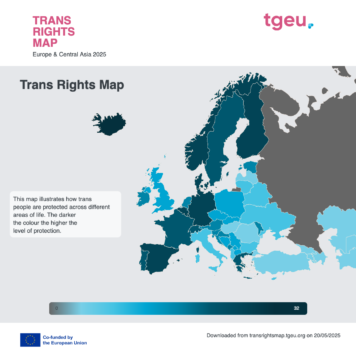In 2025, the release of TGEU’s Trans Rights Index and Map marks a sobering milestone: for the first time in over a decade, setbacks in the human rights of trans people across Europe and Central Asia outweigh progress. Lithuania, like many states in Eastern Europe, finds itself in a precarious position—lagging behind in legal protections while broader democratic values face erosion.
Lithuania: Limited Protection, Growing Urgency
The data from TGEU’s 2025 Index underscores Lithuania’s inadequate response to the needs of its trans population:
- Legal Gender Recognition (LGR): Lithuanian legislation provides for the right to change one’s gender but fails to lay out the conditions and administrative procedure for LGR, a legislative gap which the ECtHR considered to amount to a violation of Article 8 of the ECHR (L. v. Lithuania, 2007). LGR is available only through a court proceeding that is not based on self-determination and does not satisfy accessibility, clarity, and speed criteria.
- Depathologisation and Health Access: No national measures exist to depathologise trans identities or prohibit harmful practices such as so-called “conversion therapy.” Access to trans-specific healthcare remains largely unregulated and inaccessible.
- Anti-Discrimination Laws: While general anti-discrimination measures exist, they fail to fully protect trans people—especially in healthcare, housing, and public services. The terms “gender identity” and “gender expression” are notably absent from key legislation.
- Intersectional Gaps: Trans people at further risk—such as migrants, Roma, people living with HIV, or those with disabilities—face compounded discrimination and are largely invisible in policy-making.
“Lithuania’s refusal to legally recognise trans people is not just a legal issue — it’s a denial of existence,” said Vladimir Simonko, Executive Director of LGL. “Without the ability to update their documents, trans Lithuanians are exposed daily to humiliation, exclusion, and violence.”
Every Omission Is a Consequence
In Lithuania, the lack of LGR means many trans people cannot obtain identity documents matching their gender identity. This exposes them to outing, job discrimination, denied services, and police harassment. With no specific healthcare protocols or protections, many face outright denial of care or are forced to seek costly, unregulated services abroad.
“Legal invisibility fuels social stigma,” said Simonko. “When the state refuses to acknowledge trans people in law, it sends a message that trans lives are disposable. We see the impact every day—in access to education, employment, and safety.”
Defending Rights = Defending Democracy
The broader European context in 2025 reveals a direct connection between the rollback of trans rights and the erosion of democratic institutions. As anti-trans legislation increases, so too do attacks on civil society, the judiciary, and independent media. Lithuania’s democratic resilience is being tested—not just by external pressures, but by its own inaction.
“This is not only a trans issue; it’s a question of European values,” Simonko added. “If Lithuania wants to be fully aligned with EU values, it must uphold the principles of dignity, equality, and justice for all—including trans people.”
A Roadmap for Progress
Lithuania has a choice: to remain passive in the face of growing threats or to take tangible steps forward. TGEU’s data suggests a clear path for national and EU-level action:
- Implement a legal gender recognition procedure based on self-determination, free from medical or psychological gatekeeping.
- Include gender identity and expression in national non-discrimination laws, covering all areas of public life.
- Ensure access to trans-specific healthcare, grounded in human rights and informed consent.
- Acknowledge and support trans people facing multiple forms of marginalisation.
Solidarity as Resistance
Despite the grim findings of the 2025 Index, Lithuania’s civil society remains a critical line of defense. Community-led organisations like LGL continue to offer support, legal advocacy, and visibility for trans people amid a hostile legal and social climate.
“We’re not waiting for permission to exist,” said Simonko. “But we demand the same rights as everyone else. The Lithuanian government must recognise that equality delayed is dignity denied.”
Turning Point for Lithuania
Lithuania’s position on the Trans Rights Index 2025 is a reflection of its current policy failures—but not its inevitable future. By committing to meaningful legal reforms and aligning with European human rights standards, Lithuania can choose to protect not only trans lives but the democratic ideals it claims to uphold.




